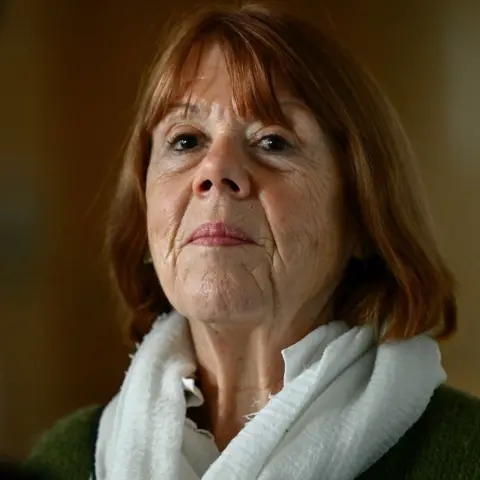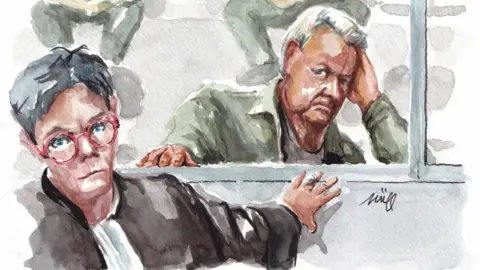 AFP
AFPIt was November 2011, and Gisèle Pelicot was sleeping too much.
She spent most of her weekends in a slumber. She was annoyed, because during the week she worked hard as a supply chain manager, and her time off was precious.
Yet she could not seem to stay awake, often drifting off without even realising it and waking hours later with no memory of having gone to bed.
Despite this, Gisèle, 58, was happy. She counted herself lucky to have her husband of 38 years, Dominique, by her side. Now their three children Caroline, David and Florian were grown, the couple were planning to soon retire and move to Mazan, a village of 6,000 people in France’s idyllic southern region of Provence, where Mr Pelicot could go on bike rides and she could take Lancôme, their French bulldog, on long walks.
She had loved Dominique since they met in the early 1970s. “When I saw that young man in a blue jumper it was love at first sight,” Gisèle would reflect, much later. They both had complicated family histories marked by loss and trauma, and had found peace with one another. Their four decades together had hit rough patches – frequent financial troubles and her affair with a colleague in the mid-1980s – but they had made it through.
Years later, when asked by a lawyer to sum up their relationship, she said: “Our friends used to say we were the perfect couple. And I thought we would see our days through together.”
By that point, Gisèle and Dominique were sitting on opposite sides of a courtroom in Avignon, not far from Mazan: she surrounded by their children and her lawyers, and he, dressed in grey, prison-issue clothes, in the defendants’ glass box.
He was facing the maximum jail term for aggravated rape and was rapidly becoming known in France and beyond as – in his own daughter’s words – “one of the worst sexual predators of the last 20 years”.
But in 2011, when Gisèle felt she was sleeping too much, she couldn’t have guessed that was how things would play out.
 Reuters
ReutersShe had no idea that, in his late 50s and nearing retirement, her husband Dominique Pelicot had been spending a lot of time on the internet, often talking to users on open forums and chatrooms where sexual material – often extreme or illegal – was freely available.
In court, he would later pinpoint that phase as the trigger for his “perversion” after a childhood trauma of rape and abuse: “We become perverted when we find something that gives us the means: the internet.”
Sometime between 2010 and 2011, a man claiming to be a nurse sent Mr Pelicot photos of his wife, drugged with sleeping pills to the point of unconsciousness. He also shared precise instructions with Mr Pelicot so that he could do the same to Gisèle.
At first he hesitated – but not for long.
Through trial and error he realised that with the right dosage of pills he could plunge his wife into a sleep so deep nothing would wake her. They had been lawfully prescribed by his doctor, who thought Mr Pelicot suffered from anxiety due to financial troubles.
He would then be able to dress her in lingerie she refused to wear, or put her through sexual practices she would have never accepted while conscious. He could film the scenes, which she would not have allowed while awake.
Initially, he was the only one raping her. But by the time the couple had settled in Mazan in 2014, he had perfected and expanded his operation.
 Reuters
ReutersHe kept tranquilisers in a shoebox in the garage, and switched brands because the first tasted “too salty” to be surreptitiously added to his wife’s food and drink, he said later.
On a chatroom called “without her knowledge” he recruited men of all ages to come and abuse his wife.
He would film them too.
He told the court his wife’s unconscious state was clear to the 71 men who came to their house over the course of a decade. “You’re just like me, you like rape mode,” he told one of them in the chat.
As the years went by, the effects of the abuse Ms Pelicot was subjected to at night increasingly began to seep into her waking life. She lost weight, clumps of hair fell out and her blackouts became more frequent. She was riddled with anxiety, certain that she was nearing death.
Her family became worried. She had seemed healthy and active when she had visited them.
“We’d ring her but most of the time it was Dominique who picked up. He would tell us Gisèle was asleep, even in the middle of the day,” said her son-in-law Pierre. “But it seemed likely because she was doing so much [when she was with us], especially running after the grandchildren.”
Police station visit changed everything
Sometimes, Gisèle came close to having suspicions. Once, she had noticed the green colour of a beer her husband had handed her, and hastily poured it down the sink. Another time, she noticed a bleach stain she couldn’t recall making on a new pair of trousers. “You’re not drugging me by any chance, are you?” she remembered asking him. He broke down in tears: “How can you accuse me of such a thing?”
Mostly, though, she felt lucky to have him with her as she navigated her health issues. She developed gynaecological problems, and underwent several neurological tests to determine if she was suffering from Alzheimer’s or a brain tumour, as she feared, but the results didn’t explain the increasing tiredness and the blackouts.
Several years later, during the trial, Dominique’s brother Joel, a doctor, was asked how it was possible that medical professionals had never put the clues together and understood Gisèle was a victim of the little-known phenomenon of chemical submission – drug-facilitated rape. “In the field of medicine we only find what we’re looking for, and we look for what we know,” he replied.
Gisèle only felt better when she was away from Mazan – an oddity she barely noticed.
It was on her return from one of these trips, in September 2020, that Dominique told her, in floods of tears: “I did something stupid. I was caught filming under women’s clothes in a supermarket,” she recalled during the trial.
She was very surprised, she said, because “in 50 years he had never behaved inappropriately or used obscene words towards women”.
She said she forgave him but asked him to promise her he would seek help.
He acquiesced, “and we left it at that”, she said.
But Dominique must have known the end was near.
Soon after he was arrested in the supermarket, police confiscated his two phones and his laptop, where they would inevitably find more than 20,000 videos and photos of his wife being raped by him and others.
 EPA
EPA“I watched those videos for hours. It was troubling. Of course it had an impact on me,” Jérémie Bosse Platière, the director of the investigation, told the court.
“In 33 years in the police, I’d never really seen that sort of thing,” his colleague Stéphane Gal said. “It was sordid, it was shocking.”
His team was tasked with tracking down the men in the videos. They cross-checked the faces and names of the men carefully logged by Dominique alongside facial recognition technology.
They were eventually able to identify 54 of them, while another 21 remained nameless.
Some of the men who were unidentified said in conversations with Dominique that they were also drugging their partners. “That, for me, is the most painful part of the case,” Mr Bosse Platière said. “To know that there are some women out there who could still be victims of their husbands.”
On 2 November 2020, Dominique and Gisèle had breakfast together before heading to a police station, where Mr Pelicot had been summoned in relation to the upskirting incident. She was asked by a policeman to follow him into another room. She confirmed Dominque was her husband – “a great guy, a good man” – but denied ever taking part in swinging with him, or engaging in threesomes.
“I will show you something you won’t like,” the police chief warned her, before showing her a picture of a sexual act.
At first, she didn’t recognise any of the two people.
When she did, “I told him to stop… Everything caved in, everything I built for 50 years”.
She was sent home in a state of shock, accompanied by a friend. She had to tell her children what had happened.
Recalling that moment, Gisèle said that her “daughter’s screams are forever etched in my mind”. Caroline, David and Florian came down to Mazan and cleared out the house. Later, photos of a seemingly drugged Caroline were also found on Dominique’s laptop, although he has denied abusing her.
 EPA
EPA‘You cannot imagine the unimaginable’
David, the eldest child, said they no longer had any family photos because they “got rid of everything linked to my father there and then”. Within days, Gisèle’s life was reduced to a suitcase and her dog.
Meanwhile, Dominique admitted to his crimes and was formally arrested. He thanked police for “relieving him of a burden”.
He and Gisèle wouldn’t meet again until they sat facing one another in the Avignon courtroom in September 2024.
By then, the story of the husband who drugged his wife for a decade and invited strangers to rape her had started to ripple across the world, aided by Gisèle’s unusual and remarkable decision to waive her anonymity and open the trial to the public and the media.
“I want any woman who wakes up one morning with no memories of the night before to remember what I said,” she stated. “So that no more women can fall prey to chemical submission. I was sacrificed on the altar of vice, and we need to talk about it.”
Her legal team also successfully pushed for the videos taken to be shown in court, arguing they would “undo the thesis of accidental rape” – pushing back against the line of defence that the men had not meant to rape Gisèle as they didn’t realise she was unconscious.
“She wanted shame to change sides and it has,” a woman who came to watch the trial in Avignon said in November. “Gisèle turned everything on its head. We weren’t expecting a woman like this.”
Medical examiner Anne Martinat Sainte-Beuve said that in the wake of her husband’s arrest, Gisèle was clearly traumatised but calm and distant – a coping mechanism often employed by survivors of terrorist attacks.
Gisèle herself has said that she is “a field of ruins” and that she fears the rest of her life may not be enough to rebuild herself.
Ms Sainte-Beuve said she had found Gisèle “exceptionally resilient”: “She turned what could have destroyed her into strength.”
Days before the trial started, the Pelicots’ divorce was finalised.
Gisèle has gone back to her maiden name. She went by the name Pelicot for the trial so that her grandchildren could be “proud” of being related to her and not ashamed of being associated to Dominique.
She has since moved to a village far from Mazan. She sees a psychiatrist but doesn’t take any medication, because she no longer wants to ingest any substance. She continues to go on long walks, but is no longer tired.
In the early days of the trial, Caroline’s husband Pierre took the stand.
A defence lawyer asked him about the Mazan years, when Gisèle was suffering from memory loss and her husband was dutifully accompanying her to unfruitful medical appointments. How could the family not have realised what was happening?
Pierre shook his head.
“You are forgetting one thing,” he said. “You cannot imagine the unimaginable.”













Leave a Reply